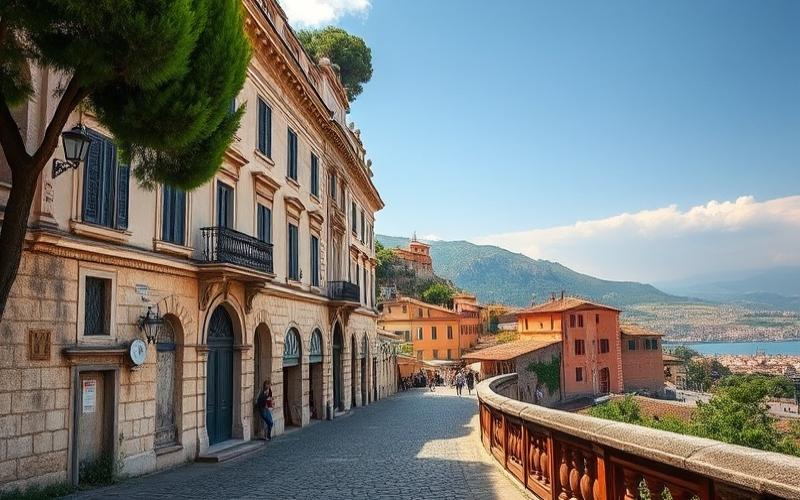
 Published on and written by Cyril Jarnias
Published on and written by Cyril Jarnias
Italy, with its rich cultural heritage, picturesque landscapes, and enviable lifestyle, attracts many foreign investors eager to purchase real estate. Whether for living, vacationing, or as a rental investment, buying property in Italy can prove to be an excellent opportunity. However, it is crucial to fully understand the specific regulations and procedures governing real estate acquisition by non-residents.
Legal Framework: What You Need to Know Before Investing
Contrary to common misconceptions, Italy does not impose major restrictions on foreigners wishing to purchase real estate within its borders. European Union nationals enjoy the same rights as Italian citizens regarding real estate acquisition. For non-EU nationals, the situation is slightly different but remains favorable, provided the principle of reciprocity is respected.
The principle of reciprocity means that citizens of a non-EU country can purchase property in Italy if Italians have the right to do the same in their home country. In practice, this principle is applied flexibly, and most countries have bilateral agreements with Italy allowing property purchases.
It is important to note that certain areas, particularly near borders or military installations, may be subject to special restrictions for national security reasons. In these cases, special authorization may be required, regardless of the buyer’s country of origin.
Good to Know:
Before embarking on purchasing property in Italy, check with the Italian embassy in your country to see if specific agreements exist regarding real estate acquisition. This will help you anticipate any additional procedures.
The Acquisition Process: From Offer to Final Deed
The process of buying real estate in Italy generally follows these steps:
- Purchase Proposal (Proposta d’acquisto): This is a formal offer made by the buyer to the seller, usually accompanied by a deposit.
- Preliminary Sales Agreement (Compromesso): Once the proposal is accepted, a preliminary contract is signed between the parties, detailing the sale conditions.
- Verification of Property Titles: The Italian notary (notaio) conducts thorough research to ensure the validity of the property title and the absence of liens or mortgages on the property.
- Final Deed of Sale (Atto di Vendita): Signed before the notary, this deed formalizes the transfer of ownership.
For foreign buyers, it is highly recommended to hire a lawyer specialized in Italian real estate law. This professional can guide you throughout the process, ensure your interests are protected, and facilitate communication with the various stakeholders.
Good to Know:
In Italy, the notary plays a central role in the real estate transaction. They are responsible for verifying the legality of the operation, drafting the deed of sale, and ensuring all taxes and fees are correctly paid. Their impartiality is guaranteed by Italian law.
Rights and Obligations: What Changes for a Foreign Owner
Once owning real estate in Italy, a foreigner generally has the same rights and obligations as an Italian citizen. However, some points deserve particular attention:
Taxation: Foreign owners are subject to Italian income tax (IRPEF) for income generated by their real estate in Italy. They must also pay the property tax (IMU) and the tax on indivisible services (TASI).
Inheritance: Italian inheritance rules apply to real estate located in Italy, even if the owner is foreign. It is crucial to research these rules thoroughly, as they may differ significantly from those in your home country.
Rental: If you plan to rent out your property, you must comply with Italian rental regulations, particularly regarding contract registration and rental income declaration.
Maintenance: Like any owner, you will be responsible for maintaining your property and paying associated charges (condominium fees, utilities, etc.).
Good to Know:
Italy has implemented tax incentives to encourage energy-efficient building renovations. As a foreign owner, you can benefit from these advantages if you undertake work to improve your property’s energy efficiency.
Winning Strategies for a Successful Investment
To maximize the chances of success for your real estate investment in Italy, here are some key tips:
- Do Your Homework: Research the local real estate market, price trends, and development prospects of the region that interests you in depth.
- Build a Trusted Local Team: Surround yourself with competent local professionals (real estate agent, lawyer, notary) who are well-versed in the specifics of the Italian market.
- Plan a Realistic Budget: Remember to include all additional costs (taxes, notary fees, agency commissions) in your budget, which can amount to 10-15% of the purchase price.
- Think Long-Term: Real estate investment in Italy should be considered a long-term venture. Consider medium to long-term appreciation potential rather than seeking quick gains.
- Respect Local Culture: If you plan to live in your property, even part-time, make an effort to integrate into the local community. Learning Italian, even the basics, will be greatly appreciated.
Good to Know:
Some Italian regions, particularly in the south, offer attractive programs to draw foreign investors, such as selling houses for 1 euro in exchange for a renovation commitment. These opportunities can be interesting but require thorough study of the conditions and actual costs involved.
Conclusion: An Achievable Dream with Proper Preparation
Acquiring real estate in Italy as a foreigner is not only possible but can prove to be an excellent investment, both financially and for quality of life. Although the process may seem complex at first, with adequate preparation and the help of competent professionals, your real estate purchase project in Italy can become a rewarding reality.
Italy offers a diversity of real estate markets, from historic cities to picturesque countryside and sunny coastlines. Each region has its unique characteristics and advantages. By taking the time to inform yourself properly, understand local regulations, and plan your investment, you can fully enjoy all the benefits that real estate ownership in this beautiful country offers.
Disclaimer: The information provided on this website is for informational purposes only and does not constitute financial, legal, or professional advice. We encourage you to consult qualified experts before making any investment, real estate, or expatriation decisions. Although we strive to maintain up-to-date and accurate information, we do not guarantee the completeness, accuracy, or timeliness of the proposed content. As investment and expatriation involve risks, we disclaim any liability for potential losses or damages arising from the use of this site. Your use of this site confirms your acceptance of these terms and your understanding of the associated risks.
















